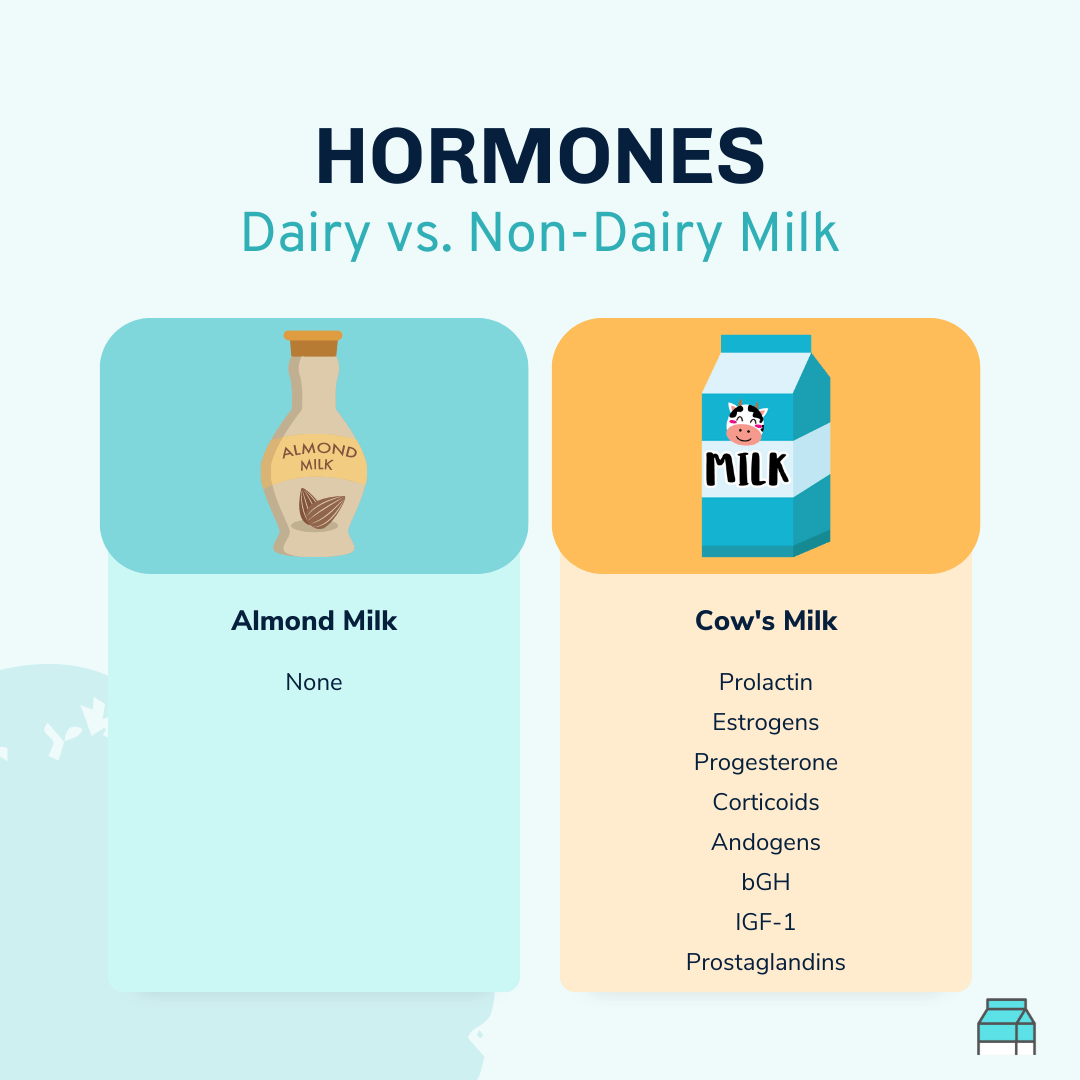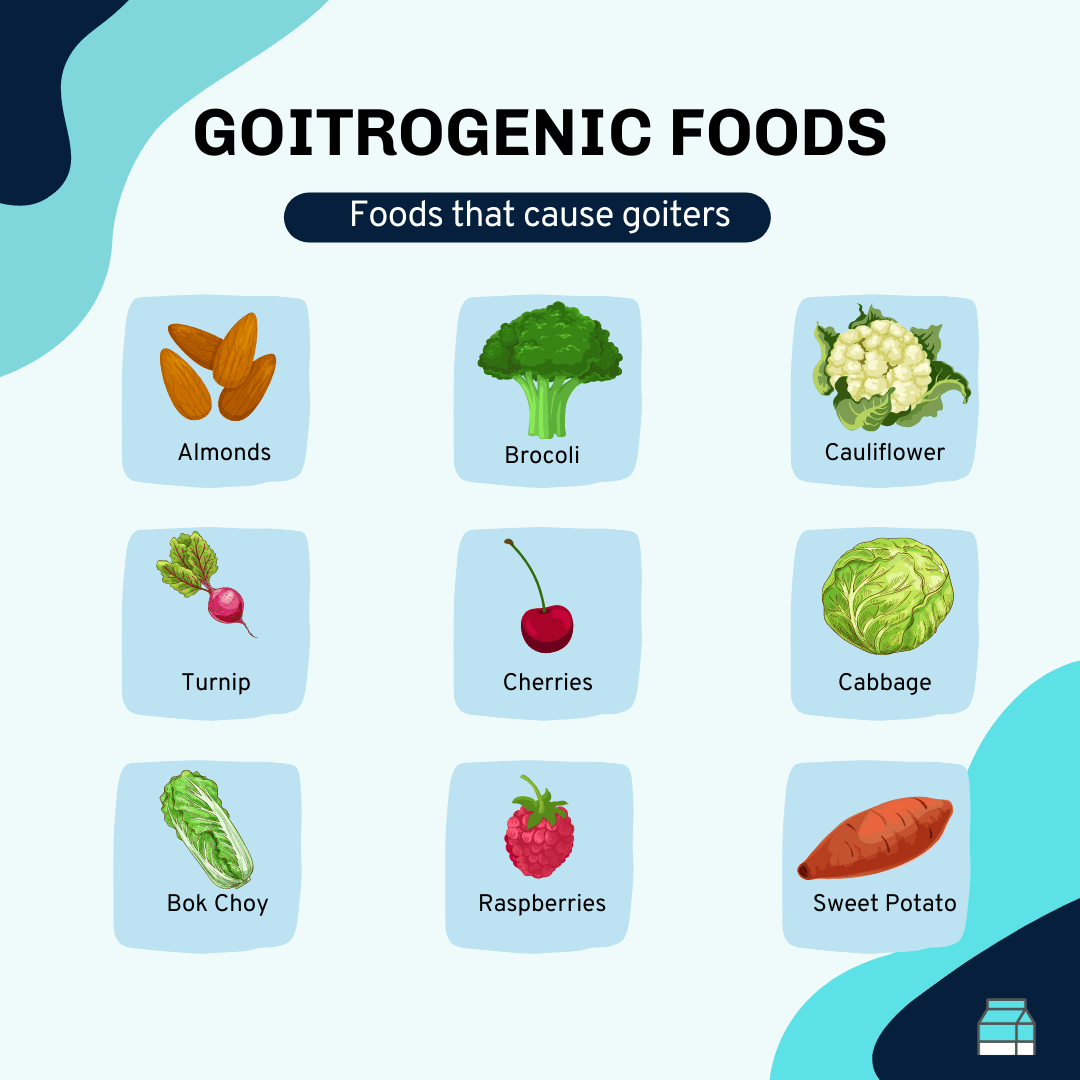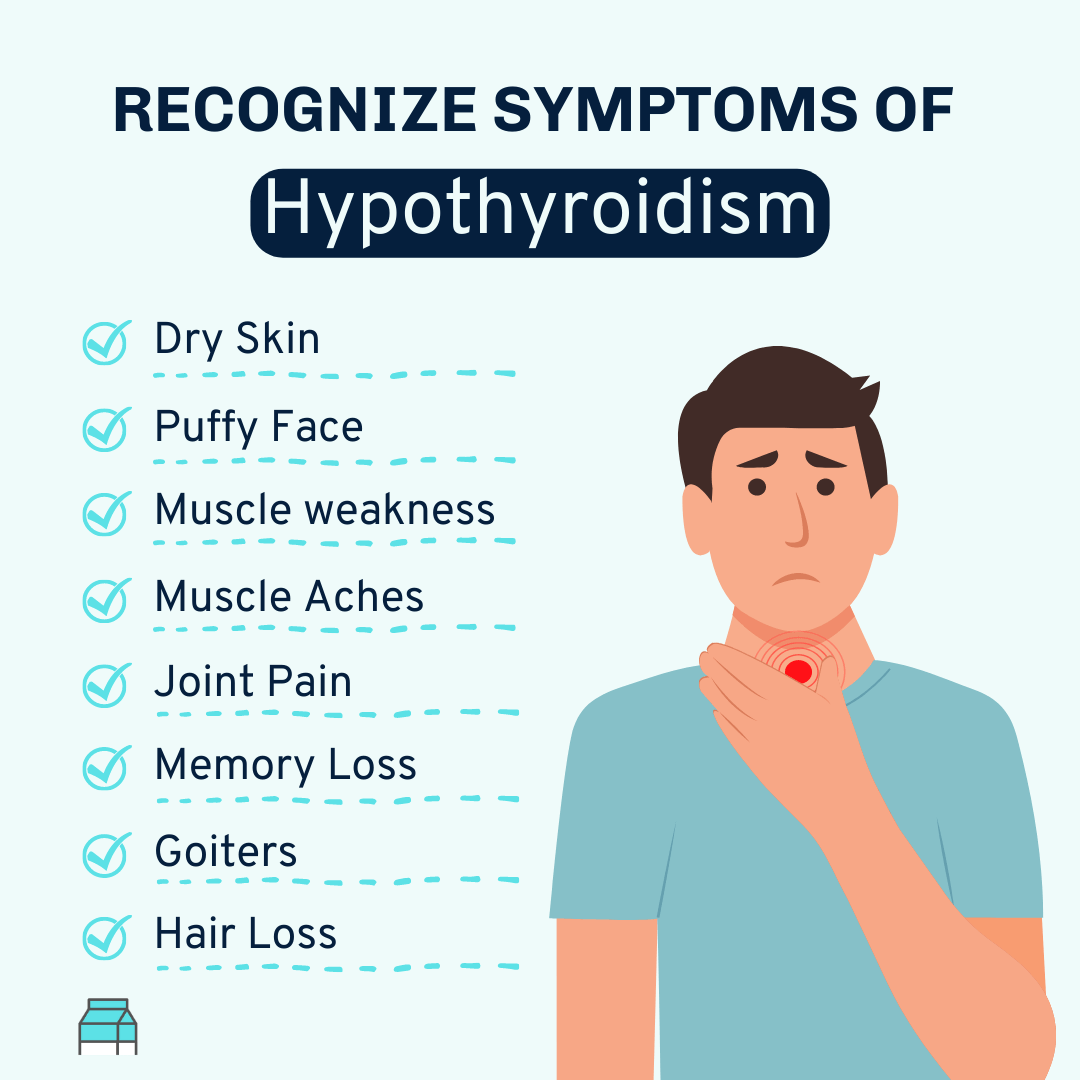If you live with a condition like hypothyroidism, your diet is integral to maintaining your health.
Hypothyroidism can affect your body’s metabolism, and the medications you take to manage it may have adverse interactions with certain foods.
Learn whether almond milk is good for hypothyroidism or if you may need to switch to an alternative plant based-milk to maintain your well-being.
Almond Milk and Hypothyroidism: An Overview
Due to the interaction of your thyroid with certain foods and the medication needed to treat hypothyroidism, it's vital to understand whether almond milk is good or bad for hypothyroidism before you drink it.
On the one hand, almond milk contains beneficial nutrients that can help boost thyroid function, helping you maintain a healthy thyroid.
But there's also a downside.
Almonds are considered goitrogens.
Goitrogens are foods that can disrupt thyroid function, interfering with iodine absorption and causing hypothyroidism.
So there is a question of whether almond milk, made from water and almonds, may have the same effect.
Let’s explore the potential benefits of almond milk for hypothyroidism and the possible reasons you may want to choose an alternative beverage.
Potential Benefits of Almond Milk For Hypothyroidism
Almond milk can be beneficial to people with hypothyroidism for many reasons.
Offers a Dairy-Free Alternative
Many people with hypothyroidism avoid dairy products due to digestive issues.
Digestive problems often stem from lactose intolerance, a condition in which your body can’t break down the sugar, called lactose, in dairy milk.
If you have lactose intolerance, moving to plant-based milk like almond milk can aid your overall well-being and benefit your thyroid function.
Some studies have shown that cow’s milk contains differing forms of naturally-occurring hormones that can affect your body’s hormone functions.
These hormones include:
Hypothyroidism is an endocrine condition that directly affects how your body produces and distributes necessary hormones.
Drinking cow’s milk can have a negative effect on your already dysregulated endocrine system if you have an underactive thyroid.
Alternatively, almond milk doesn’t contain hormones (since it comes from a plant rather than an animal), so it doesn’t cause hormone dysregulation in the same way.

Provides Several Nutrients
Almond milk provides several nutrients that can boost your health when you suffer from hypothyroidism.
Each brand differs in its nutritional profile, but generally, one cup of almond milk contains:
Almond Milk Nutrition Facts | |
|---|---|
Calories | 39 |
Protein | 1g |
Fat | 3g |
Carbohydrates | 4g |
Fiber | 1g |
Sugar | 2g |
Calcium | 184mg |
Potassium | 67mg |
Vitamin D | 41 IU |
Vitamin E | 6.33mg |
Vitamin D is a nutrient that can help improve your mood and is sometimes low in people with hypothyroidism.
Some almond milk contains added B Vitamins, which are essential for the production of thyroid hormones and metabolism, which is affected by the condition.
Almond milk with added iron and selenium can also benefit people with hypothyroidism.
Iron can help you manage anemia caused by hypothyroidism, and selenium can help you manage other symptoms by reducing thyroid peroxidase antibodies.
It’s important to note that not all almond milk brands contain the same nutrients.
Some brands, such as Elmhurst Almond Milk or New Barn Organics, use only almonds, water, and salt.
These brands are considered healthy because they contain fewer added ingredients.
In this respect, they can serve as a “clean eating” beverage and keep your diet free of additives like carrageenan and guar gum.
However, if supplementing your intake of other nutrients, like calcium, Vitamin D, or iron, for hypothyroidism, you may need to look for a brand that fortifies their beverage.
Some store-bought brands add nutrients that aren’t present in homemade or organic almond milk.
The trade-off, however, is that you may take in other additives, so it's important to read the label and decide which ingredients may or may not affect your condition.
Check out our Almond Milk 101 video below to learn more about the general benefits of almond milk!
Possible Complications From Drinking Almond Milk With Hypothyroidism
Despite possible benefits from drinking almond milk with hypothyroidism, there are also a few significant concerns.
The two most common issues with almond milk for hypothyroidism are its potential as a goitrogenic food and lack of iodine.
Almonds Are Goitrogenic
Almonds are considered a goitrogenic food, along with other fruits from the Rosaceae family, such as cherries, pears, raspberries, and plums.
Goitrogenic causes your thyroid gland to swell, also called a goiter.
Goitrogens interfere with iodine absorption in your thyroid, which leads to low thyroid hormone levels and swelling.
Goiters can be unsightly, and if they grow too large, they can interfere with swallowing, speaking, and even breathing.
You are already at a high risk of developing a goiter if you have hypothyroidism, so it's best to avoid goitrogenic foods if you have the condition.
Because almond milk is made of almonds and water, it may negatively affect your thyroid.
However, it's important to remember that almond milk brands use different amounts of almonds.
The amount of goitrogenic almond that makes it into the finished beverage may be too small to interfere with your hormone production.

Almond Milk Is Typically Low in Iodine
Unless an almond milk brand has added iodine, you risk lowering your iodine levels even lower by drinking it over dairy milk.
With hypothyroidism, your body already has trouble utilizing iodine, so drinking almond milk can worsen an existing problem.
Dairy milk provides 49% of the U.S. population’s daily iodine intake.
Plant-based milk, including almond milk, only contains a fraction of the RDA of iodine.
The impact of drinking low-iodine almond milk on hypothyroidism depends on the rest of your diet and your body’s unique biochemical processes.
For example, if you eat iodine-rich foods, such as iodized salt, tuna, shrimp, or eggs, you may be able to enjoy almond milk without any complications.
What is Hypothyroidism?
Hypothyroidism is a condition that affects the function of your thyroid gland.
Your thyroid is an endocrine gland located inside your neck.
It is responsible for making thyroid hormones and maintaining iodine homeostasis in your body.
Thyroid hormones include thyroxine (T4) and triiodothyronine (T3), which affect protein synthesis, calcium homeostasis,
With hypothyroidism, your thyroid is underactive and doesn’t produce enough of these essential hormones.
Hypothyroidism usually results in weight gain, cold intolerance, fatigue, depression, and constipation.
Hyperthyroidism is a separate but related condition that refers to an overactive thyroid gland.
Hyperthyroidism happens when your thyroid creates too many thyroid hormones, resulting in weight loss, heat intolerance, diarrhea, and anxiety.
How Do You Know If You Have Hypothyroidism?
You may not have any symptoms in the early stages of the condition.
Eventually, you may notice weight gain despite not overeating or constantly feeling cold or tired.
If your hypothyroidism is left untreated, you may suffer more severe symptoms such as joint pain, obesity, heart disease, or infertility.
The following are also common symptoms you may notice with hypothyroidism:
- Heightened sensitivity to cold
- Dry skin
- Puffy face
- Muscle weakness
- Muscle aches, tenderness, and stiffness
- Elevated blood cholesterol level
- Joint pain, stiffness, or swelling
- Irregular periods
- Hair loss or thinning
- Slowed heart rate
- Impaired memory
- Enlarged thyroid gland (goiter)
The only way to be sure you are suffering from a thyroid condition is to visit your doctor.
They can perform a thyroid function test to give you an official diagnosis.
For example, you may undergo blood tests to assess your TSH (thyroid-stimulating hormone) levels. Low TSH typically indicates hypothyroidism.

Who is At Risk For Hypothyroidism
The people most at risk for hypothyroidism are women over 50.
However, you may also have an increased risk of developing the condition if you:
- Have a history of taking anti-thyroid medications
- Have been treated with radioactive iodine for thyroid cancer
- Have had thyroid surgery
- Been exposed to radiation in your upper chest or neck
- Have type 1 diabetes
- Have rheumatoid arthritis
- Suffer from an autoimmune disorder
- Your family has a history of autoimmune disorders, thyroid disease, or thyroid cancer
How Is Hypothyroidism Treated?
Hypothyroidism is typically treated with synthetic thyroid hormone medication, such as levothyroxine.
However, finding the right dosage can take time and is affected by your diet and lifestyle.
For instance, levothyroxine absorption is affected by high amounts of soy in your diet and by high-fiber diets.
Calcium and iron supplements can also affect your body’s absorption of the hypothyroid medication.
You must pay attention to what you eat and drink and how it affects your thyroid function and hypothyroid medication to avoid worsening your condition.
Is Almond Milk Good For Hypothyroidism?
The bottom line is that while almond milk may contain beneficial nutrients that aid your thyroid in producing essential hormones, it can also have an adverse effect if you have hypothyroidism.
Every person’s hypothyroidism is unique to their biochemical makeup.
Additionally, almond milk nutrients vary significantly by brand, additives, and even the almonds used to make the product.
Like any dietary choice, you should consult your doctor about whether almond milk may be an issue for your hypothyroidism and how to tell if it has a positive or negative effect.
